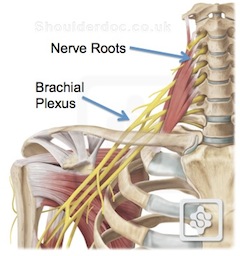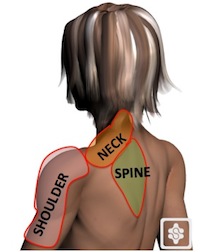Neck Pain referred to the Shoulder
Lennard Funk, 2012
Pain felt in the shoulder area can sometimes be coming from your neck. This is because the nerves and muscles that arise from your neck pass through your shoulder on their way down the arm. The nerves from your neck (Nerve Roots) also travel down your arm (via the Brachial Plexus). Thus neck pain may extend down your arm.

Pain from your neck is usually felt mainly at the top of your shoulder over your trapezius muscle, whilst pain from your shoulder is normally felt over your upper arm.

The pain is NOT made worse with movement of your shoulder, so your shoulder moves freely without aggravating the pain. This is the simplest way to know that the pain is not from your shoulder, but from your neck!
However, it can become confusing because many people with neck-related shoulder pain also develope weakness of their shoulder rotator cuff muscles and get subacromial impingement of the shoulder. It takes an experienced clinician to help you to differentiate the two sources of pain.
If the pain is from your neck joints (cervical spine) and ligaments the pain is often a dull ache. If the pain is from a trapped nerve then the pain can be very, very severe. You may also get pins and needles or numbness in your hand. This is typically in the distribution of the affected nerve (known as a dermatome).
An MRI scan of your neck is the most useful investigation to see the inner anatomy of your neck and any problems therein.
The common causes of shoulder pain from the neck are:
- Cervical spondylosis - arthritis of the spine
- Spinal Stenosis - narrowing of the spine, usually due to arthritis
- Disc prolapse - the spongy disc is pushed backward and presses on the nerves to your arm. This can be very painful.
- Ligament or muscle injury - usually after a fall or motor accident.
Acromioclavicular joint pain can radiate to your neck in the same area as referred pain from the neck.
Therefore, an experienced shoulder or neck specialist is needed to assess both your neck and shoulder to differentiate between the two. Neck and shoulder specialists often work together to optimally treat the pain.


